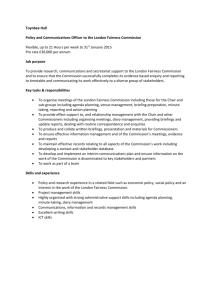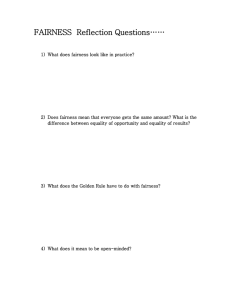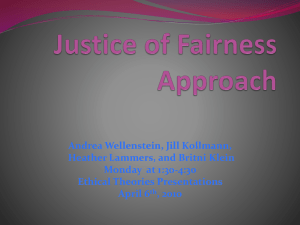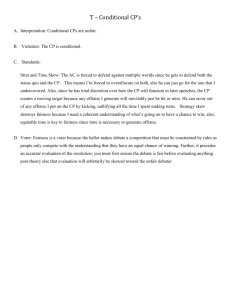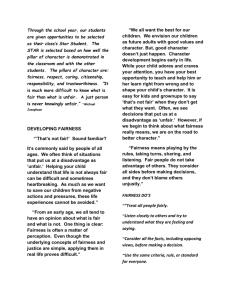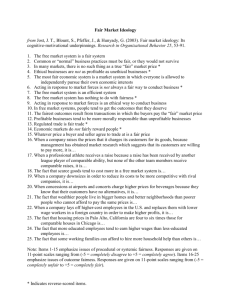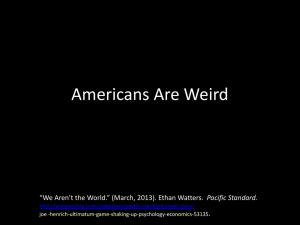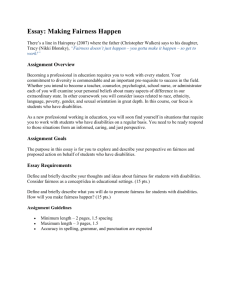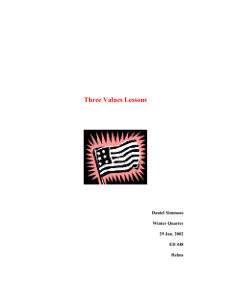MN426 - 08 - C - Kahnemann, Knetsch, Thaler
advertisement
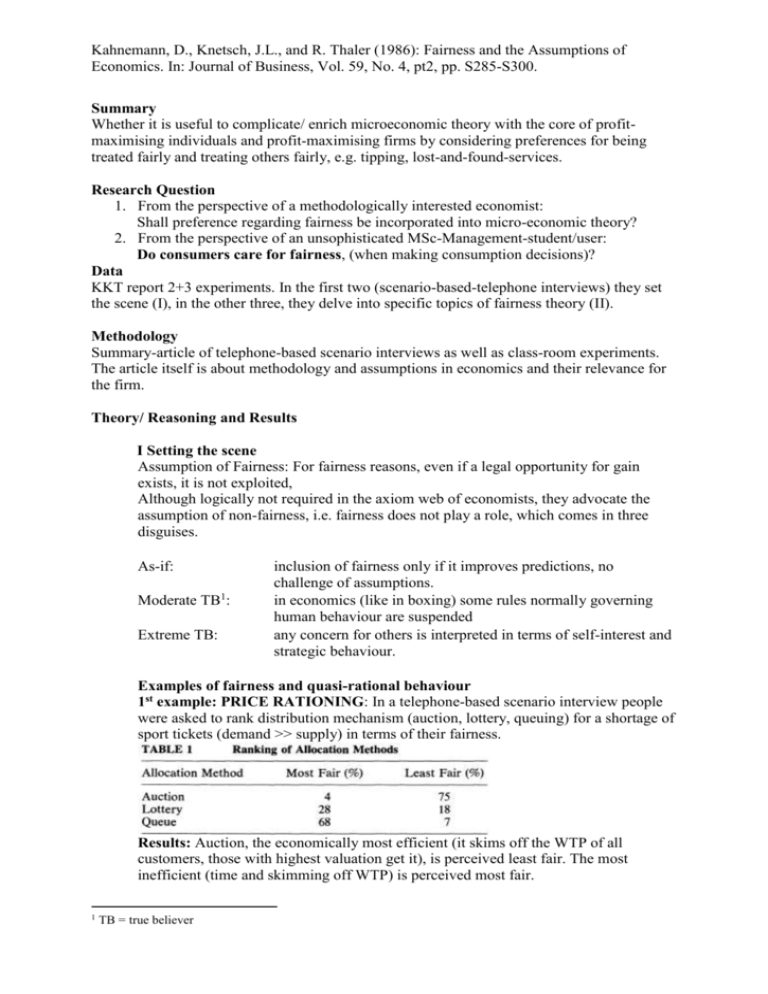
Kahnemann, D., Knetsch, J.L., and R. Thaler (1986): Fairness and the Assumptions of Economics. In: Journal of Business, Vol. 59, No. 4, pt2, pp. S285-S300. Summary Whether it is useful to complicate/ enrich microeconomic theory with the core of profitmaximising individuals and profit-maximising firms by considering preferences for being treated fairly and treating others fairly, e.g. tipping, lost-and-found-services. Research Question 1. From the perspective of a methodologically interested economist: Shall preference regarding fairness be incorporated into micro-economic theory? 2. From the perspective of an unsophisticated MSc-Management-student/user: Do consumers care for fairness, (when making consumption decisions)? Data KKT report 2+3 experiments. In the first two (scenario-based-telephone interviews) they set the scene (I), in the other three, they delve into specific topics of fairness theory (II). Methodology Summary-article of telephone-based scenario interviews as well as class-room experiments. The article itself is about methodology and assumptions in economics and their relevance for the firm. Theory/ Reasoning and Results I Setting the scene Assumption of Fairness: For fairness reasons, even if a legal opportunity for gain exists, it is not exploited, Although logically not required in the axiom web of economists, they advocate the assumption of non-fairness, i.e. fairness does not play a role, which comes in three disguises. As-if: Moderate TB1: Extreme TB: inclusion of fairness only if it improves predictions, no challenge of assumptions. in economics (like in boxing) some rules normally governing human behaviour are suspended any concern for others is interpreted in terms of self-interest and strategic behaviour. Examples of fairness and quasi-rational behaviour 1st example: PRICE RATIONING: In a telephone-based scenario interview people were asked to rank distribution mechanism (auction, lottery, queuing) for a shortage of sport tickets (demand >> supply) in terms of their fairness. Results: Auction, the economically most efficient (it skims off the WTP of all customers, those with highest valuation get it), is perceived least fair. The most inefficient (time and skimming off WTP) is perceived most fair. 1 TB = true believer Kahnemann, D., Knetsch, J.L., and R. Thaler (1986): Fairness and the Assumptions of Economics. In: Journal of Business, Vol. 59, No. 4, pt2, pp. S285-S300. 2nd example: FRAMING: In a telephone-based scenario interview people were asked what their on-the-beach-WTP was for a good (a beer) from a stall-seller or a fancy hotel. Results: People had different WTP. People consider different prices as appropriate. Consequently, both retailers/ sellers face different demands. II Studies: Question: Why do firms not exploit legal opportunities for gain? Radical Less radical b/c they have preference for fairness b/c fear customers withholding biz. 1. Resisting Unfairness Experiment 1: Ultimatum Game. Prediction: Game-Theoretic Prediction, i.e. NE: Sender offers sth., receiver accepts. => Result: However, substantial proportion of participants rejected positive offers. There exists a wide-spread readiness to resist unfair transactions or event to punish unfair actors at some cost. => Interpretation: (1) This poses a threat to firms in a competitive environment. Experiment 2: Prevalence of unenforced fairness (different from 1st exp. because there fairness could be justified by fear of offer being rejected) in anonymous transactions and establish whether people are willing to incur costs and to punish unfairness directed at someone else. 1st stage: unenforced fairness - complete anonymity, no opportunity to retaliate (in original UG, the receiver’s rejection can be interpreted as retaliation). => Result: Still fair allocation 2nd stage: Would subjects pay $1 to punish unfair while rewarding a fair one? => Results: Yes, 74%. People prefer sharing $10 with fair allocator to sharing $12 with unfair one. 2. Cost Plus is NOT the rule of fair pricing Theory had it that, consumer perceive companies (trade and craft) as middlemen. Brokerage function of the firm. Hence: Cost-plus-pricing would be perceived as fair price. How would consumers perceive passing on of cost reductions? Hypothesis: (1) Cost-plus is perceived as a fair pricing rule only for savings due to (a) lower input costs not for (b) lower costs due to efficiency gains2. (2) It is perceived as a fair rule only for middlemen not for producers. Methodology: Scenario-based telephone interview. Questions were asked with respect to four kinds of firms: - factory, - carpenter, - wholesaler, - furniture store. => Results: H rejected in all cases. Failure of the cost-plus hypothesis. Fairness standards applied by consumers to firms are more favourable than cost-plus rule. No difference between producers and retailers. Between-respondent analysis shows no difference bettween efficiency gains and lower input costs with respect to their fairness perception. Here, however,within-individuals-analysis showed that those individuals that made a difference between the two cases considered efficiency gain retainment as okay (as was suggested by the original hypothesis). 3. Rules of Fairness Community standards of fairness with firms. 2 The notion of a brokerage agreement between the supplier and the custoemr suggests that cost decreases due lower input costs have to passed on to consumers, whereas cost decreases due to better efficiency can be retained. Kahnemann, D., Knetsch, J.L., and R. Thaler (1986): Fairness and the Assumptions of Economics. In: Journal of Business, Vol. 59, No. 4, pt2, pp. S285-S300. Hypothesis: No Hs. Just finding out community standards of fairness Methodology: Telephone-based-scenario interview. (See above) => Results: (1) unfair for firms to exploit increase in market power at direct expense of consumer (here tenant, employee, customer) (which is a rejection of excessive monopoly power and price discrimination) (2) It is acceptable for firms to keep profits at the reference level. Hostility of respondents to exploitations of excess demand: transactors (customers, tenants, employees) are entitled to the terms of the reference transaction, which cannot be violated arbitrarily by firms to increase their profits. Rules of fairness permit firms to pass on cost increases yet are allowed to retain benefits of cost reduction. Fairness and Framing Judgment of fairness can only be understood in conjunction with the factors determining the selection of reference transaction. Reference transaction often tied to particular good. The following passage I found hard to understand. I did not fully get it, which is the reason for which I pasted it in here. Please feel free to comment. Kahnemann, D., Knetsch, J.L., and R. Thaler (1986): Fairness and the Assumptions of Economics. In: Journal of Business, Vol. 59, No. 4, pt2, pp. S285-S300. Results Theoretical speculation about rules of fairness is not a substitute for observing community standards. A number of phenomena can be predicted with rules of fairness, wage stickiness, asymmetric price rigidities. Opposition to price rationing may lead to sellouts (which is a kind of a market failure, as the market does not clear) for a good, e.g. Football matches. More temporary discounts than temporary surcharges. Description of transactors should include 1. preference of being treated fairly and treating others fairly 2. willingness to resist unfair firms, even at some costs 3. They have implicit rules that specify, which actions are considered unfair a. Rules of Fairness cannot be inferred from economic models or introspection. b. Rules of Fairness are influenced by framing and other non-economic factors. => Data is needed. Criticism Relation to management in two ways. Regarding the relation of the firm with its customers, etc. in terms of pricing and behaviour; yet, also regarding the model of the economic agent inside the firm, wants to be treated fairly as well. The use of the word “fairness”: doesn’t everybody understand something different under “fairness”? The surprising result that firms are allowed to retain their efficiency gains. Maybe the word “fairness” has a framing effect as well. Respondent did not consider fairness a category applicable to firms. Links to (other) topics (of the course) - Tasks of the General Manger o The Perception of the Firm by stakeholders (esp. consumers) - Human Resources o Pay and Fairness in the Labour relationship o Wage stickiness, Sources thereof - Pricing o Price Rationing o And Monopoly Power Kahnemann, D., Knetsch, J.L., and R. Thaler (1986): Fairness and the Assumptions of Economics. In: Journal of Business, Vol. 59, No. 4, pt2, pp. S285-S300. - - - o Price Discrimination Quasi-Rational Behaviour, bounded rationality, biases (Lecture 3) o Framing o Relation of Theory and Empirics. Need for observing community standards. o Reference level Quantitative Analysis o Within-individual analysis vs. between-individual analysis Experimental Method o Telephone Interviews o Methods for Preference revelation Economics o Assumptions o Market Failure due to fairness considerations
